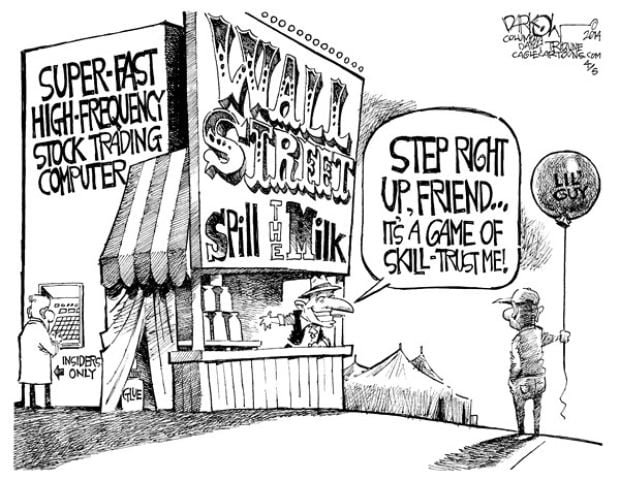
It's a good way to remain abreast of what's up.
You can subscribe here:
http://www.fca.org.uk/news/june-2015
A couple of issues of note:
Fair and Effective Markets Review (FEMR).
FEMR made a number of findings and published 21 recommendations designed to ensure that wholesale Fixed Income, Currency and Commodity (FICC) markets are fair and effective.
The final findings are now available (from the BoE).
http://www.bankofengland.co.uk/markets/Documents/femrjun15.pdf
Benchmarks
The final findings are now available (from the BoE).
http://www.bankofengland.co.uk/markets/Documents/femrjun15.pdf
Benchmarks
Well, first there was one: Libor
...and what a kerfuffle that made with the "Wheatley Review"
https://www.gov.uk/government/uploads/system/uploads/attachment_data/file/191762/wheatley_review_libor_finalreport_280912.pdf
...and then there were some standards...
IOSCO Standards for Financial Benchmarks.
https://www.iosco.org/library/pubdocs/pdf/IOSCOPD415.pdf
...and then there were 7 more to add to the fold...
The benchmarks being brought into scope are:
Sterling Overnight Index Average (SONIA)
Repurchase Overnight Index Average (RONIA)
ISDAFIX (soon to be renamed the ICE Swap Rate)
WM/Reuters (WMR) London 4pm Closing Spot Rate
London Gold Fixing (soon to be replaced by the LBMA Gold Price)
LBMA Silver Price
ICE Brent Index
I think all of the above are fairly familiar....but for me, I was not aware of the State Street tie in with WMR.
The benchmarks being brought into scope are:
Sterling Overnight Index Average (SONIA)
Repurchase Overnight Index Average (RONIA)
ISDAFIX (soon to be renamed the ICE Swap Rate)
WM/Reuters (WMR) London 4pm Closing Spot Rate
London Gold Fixing (soon to be replaced by the LBMA Gold Price)
LBMA Silver Price
ICE Brent Index
I think all of the above are fairly familiar....but for me, I was not aware of the State Street tie in with WMR.
The WM Company (WM being World Markets, interestingly, a State Street business.):
http://wmcompany.com/wmr/Services/ClosingSpotRates/index.htm
http://wmcompany.com/pdfs/WMReutersMethodology.pdf
Now for those of us familiar with the closing price process (Mark to Market, margining etc.) the importance of all the above makes sense. However, with the renewed interest in this sector it does highlight further potential conflicts of interest. Hence...
FCA's CP15/18: Fair, reasonable and non-discriminatory access to regulated benchmarks
http://www.fca.org.uk/news/cp15-18-frand-access-benchmarks?RRU0615§ion=investment-managers
Then of course, with all ths happening at the UK level...whats going on at the EU level?
FCA's CP15/18: Fair, reasonable and non-discriminatory access to regulated benchmarks
http://www.fca.org.uk/news/cp15-18-frand-access-benchmarks?RRU0615§ion=investment-managers
Then of course, with all ths happening at the UK level...whats going on at the EU level?
More here:
http://ec.europa.eu/finance/securities/benchmarks/index_en.htm
This is 'dangerous' stuff. What is in scope and what is out of scope? To make matters worse there doesn't appear to be consensus between the Parliament / Council and Commission.
In conclusion it leaves me wondering 2 things:
In conclusion it leaves me wondering 2 things:
1. Regulators want "Champagne Benchmarks" whilst the industry has a "Beer Budget". Great benchmarks, committees, supporting data and process etc all comes at a cost....which leads to;
2. Have we lost sight of the golden goose? Somewhere in here there is a fine line between "materiality and proportionality". Sure, asset managers / users need great benchmarks...but if the operational risks and responsibilities and not to mention the regulatory risks deter contributors...have we really improved the quality and robustness of a benchmark? Sometimes a Mini is perfectly adequate to travel from A to B. We don't always need a Rolls Royce (as nice as that may be).
Anyway, enough about Benchmarks for today. Obviously always interested for any thoughts and feedback on the topic. My interest is now that we've arrived here, where is this segment going and how will it get there?
A little bit of surfing...
A little bit of surfing...
I enjoyed this...I started with Global Warming but found myself drawn in...
http://www.bloomberg.com/graphics/2015-whats-warming-the-world/
http://www.bloomberg.com/graphics/2015-whats-warming-the-world/
Minimum wage / Base salary.
I like what this CEO has done in terms of addressing the "minimum wage" debate.
The article doesn't actually say what the lowest salary is, but it does say about 30 people can see a pay rise upto the new 70K as a minimum salary level.
No science to support it, but lets say 30 people on average get a lift of 25K (some more, some less). At a cost of 750K, and lets allow some loading, so say 1 myn, that looks like a worthwhile gesture and investment. I can think of a lot of other projects that wouldn't get as good a return for a 1myn investment.
The problem is, we still don't account for things like intellectual capital, employee churn etc. The 'soft' metrics are still not measured in hard dollar or operational risk terms.
http://www.foxnews.com/us/2015/04/15/seattle-boss-raises-entire-company-minimum-wage-to-70000/?utm_source=zergnet.com&utm_medium=referral&utm_campaign=zergnet_485717
...and finally...
After International Derivatives Week (https://idx2015.fia.org/) I was tempted to do a little swim for a good cause. A crossing from one land mass (UK) to another (The Isle of Wight).
After International Derivatives Week (https://idx2015.fia.org/) I was tempted to do a little swim for a good cause. A crossing from one land mass (UK) to another (The Isle of Wight).
http://www.swimmingthesolent4mnd.com/
Sea Temperature (circa a toasty 17.5 degrees)
http://www.seatemperature.org/europe/united-kingdom/ryde-september.htm
Any feedback always welcome.
Have a great week-end one and all!
Scott.
www.clearingandsettlement.blogspot.com
Scott.
www.clearingandsettlement.blogspot.com
